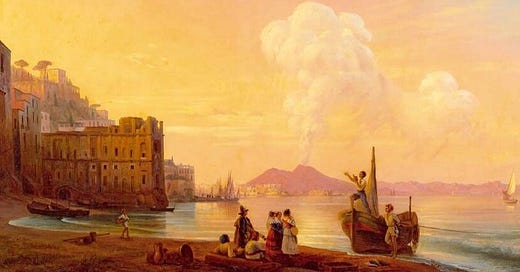What does your character think about the relative merits of the city and country?
Much depends on his world.
It may be hard to convey in the modern, urbanized world, but the idyllic dreams of the Arcadian countryside are uncommon in a rural world. Arcadia is, on the whole, the dream of city folks.
One does note, though, that in the Roman times, Arcadia was populated by shepherds and goatherds. This reappeared in Renaissance times. Only once out of early modern times do farmers get this treatment.
That's a consequence of better transportation and food preservation. In the days when food was borne in carts without refrigeration, or at best boats, also without refrigeration, the more perishable it was, the closer it had to start. Therefore farms had to be close to the city depending on their goods. Milch cows, perishable strawberries, lettuce for salad and others might be actually raised in the city itself.
Those earlier eras were close enough to the farming life that they were aware that sitting around, watching the herd and able to do only such things as were compatible with watching and leaping up whenever needed, was the height of leisure.
A city, on the other hand, was a dream. True, they were often hotbeds of disease and death, but life in the country was also fatal much more frequently than nowadays, and the city was the center of wealth and luxury.
Books were not cheap, and libraries were far more feasible in the city. The concentration of people made schools possible because they could find enough pupils. Not to mention that literacy was far more useful in the city, because that was where the jobs requiring it concentrated.
Cities are habitually situated at ports or on rivers -- frequently the confluences of rivers -- or if nothing else, great roads. Trade passed through it, bringing wonders from far away, where a village might have a peddler who passed through every few years -- or not have one.
This would also bring more strangers to the city, and more encounters with strangers. The city was less rustic, less provincial -- people learned to be civil and have politeness -- and its inhabitants were more urbane.
A peasant who aspired to wealth was far more likely to achieve it by running off to the city. All the more in that while they would be aware he could be fleeing justice, and he had to start out with such labor as he could catch, there was a chance that he would be accepted.
Though he might at first have to live in the suburbs. Cheap housing in the city was small, ill-built, and packed together, but soon enough they built outside the city walls -- the sub-urbs. Probably even before it was quite safe from soldiers. It have all the worst traits of city housing plus a long walk to get to anything inside. A dreamy peasant or townboy might find himself disillusioned enough to trudge back home.
But still the dreams would continue, on the order of Arcadia, of the Shining City on the Hill. A place of knowledge, order, grandeur, and other wonders. Even a doomed city that deserves its doom has an element of grandeur to it that makes its destruction have a tragic edge to it.
This gives a different approach to ruins. In earlier days, a scene describing how deer walk down the streets of a once great city, how wildflowers bloom in their gardens, how birds nest in niches, would describe a great disaster. Wild animals living where once humans lived did not have a charm to it.
We can still see a ruin as a desolation, we can still feel the impact of
But wild beasts of the desert shall lie there; and their houses shall be full of doleful creatures; and owls shall dwell there, and satyrs shall dance there. And the wild beasts of the islands shall cry in their desolate houses, and dragons in their pleasant palaces: and her time is near to come, and her days shall not be prolonged.
A writer nowadays trying to make a city's fall a bad thing would emphasize the destruction of elegant statues and other beauties, the choking out of pleasant flowers with rank weeds, how the plants are lopsided and malformed. Birds are dingy, their cries are squawks and harsh cries, and they are engaged in fighting with each other and stealing food, not so much building nests. Rats scuttle and bare their teeth and carry the scars of their fights. Bones lie here and there.
Such are the elements of trying to convey the thoughts of another era to the modern mind.





Something I remember reading about pre-modern cities was that they had to have a constant flow of people coming to dwell in them because the death rate was so high that they would've been swiftly depopulated if not.